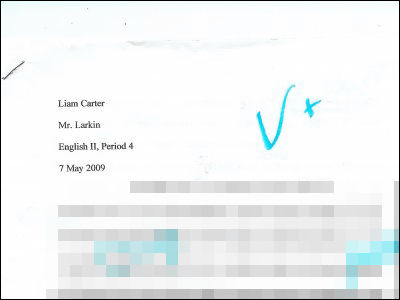What should you keep in mind to prevent students from cheating?

Due to the spread of COVID-19, many universities are conducting online classes, and some have introduced
Motivation is a key factor in whether students cheat
https://theconversation.com/motivation-is-a-key-factor-in-whether-students-cheat-155274
Many universities have introduced systems to monitor student cheating during remote learning. However, there are concerns that the cheating monitoring systems' algorithms are not transparent and that inappropriate decisions, such as 'a student's lack of internet connection was flagged as cheating' or 'a student's habit of reading the question aloud' were flagged as cheating.
University students struggle with monitoring of 'anti-cheating software' introduced with remote learning - GIGAZINE

'Cheating monitoring systems cause anxiety and distress to students,' says Fong. Based on
◆ Don't emphasize the importance of test scores
When teachers overemphasize the importance of test scores to students, students are more likely to cheat. 'Test scores are an important factor in evaluating grades, but students also need to master skills and engage in real-world learning, in addition to getting high test scores,' Fong said.
◆ Focus on acquiring specialized knowledge
According to Fong, when teachers focus on helping students improve their skills and acquire knowledge, student cheating decreases. This suggests that students who are motivated to acquire specialized knowledge are less likely to cheat. Therefore, teachers should give students opportunities to retake assignments and tests and teach classes that emphasize knowledge acquisition.
◆ Motivate students to learn
'Students who see the relevance of what they're learning to their field of study, their future careers, and other learning opportunities are less likely to cheat. In contrast, students who lack motivation tend to focus on completing the courses they've taken, rather than acquiring knowledge, which increases the likelihood of cheating,' Fong said. Therefore, instructors can curb cheating by clearly explaining the benefits of the learning content and connecting the course content to students' interests.

◆ Encourage self-directed learning
Students tend to cheat when they feel they are being forced to learn by their teachers. Offering students options and making them feel like they are learning independently reduces cheating, Fong argues.
◆Give students confidence
Fong's research has shown that when students feel they can succeed in class, they are less likely to cheat. 'By understanding students' abilities and learning stages and gradually increasing the difficulty level, we can increase students' confidence in tackling new learning content. When students feel confident in their learning, they are more likely to put in the extra effort,' Fong said.
Related Posts:







